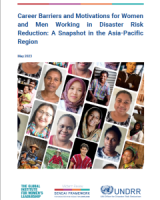Career Barriers and Motivations for Women and Men Working in Disaster Risk Reduction

Abstract
In 2022 we partnered with the United Nations Office for Disaster Risk Reduction (UNDRR) to undertake research to better understand career motivation and barriers among women and men working in disaster risk reduction in the Asia-Pacific region.
In particular, we hoped to develop a clear picture of women and men’s workplace experiences, including for example, how they are treated by others, the availability of role models, experiences with discrimination, and the quality of their relationships inside and outside of work. The survey sought to understand the impact that these experiences have on women’s and men’s psychological engagement, including their ambition, leadership aspirations, their sense of fitting in and belonging, their feelings of authenticity or feeling like an imposter; and then in turn, examine how these impact on workplace outcomes including performance, promotion and progression, as well as job satisfaction, health and wellbeing.
The goals of this research are to:
- Identify enablers and barriers to women’s careers and leadership aspirations in disaster risk reduction (DRR)
- Explore the ways in which workplace outcomes are different for women and men
- Understand what predicts these differential outcomes and what opportunities there are to redress them
The report identified barriers to women’s career advancement, well-being and longevity in DRR including but not limited to: women’s lower willingness to sacrifice for their careers (likely influenced by lower expectations that these sacrifices will be rewarded), care demands placed on women with children, organisational constraints on women’s workplace authenticity, lower work-life balance and lower quality professional relationships with co-workers and especially senior colleagues. The study also uncovered barriers to men’s well-being in DRR, particularly in regard to their experiences of bullying, burnout and desire to leave the profession. Importantly, the findings also offer insight into what organisations and the DRR profession more broadly can do to improve women and men’s career outcomes in DRR.













